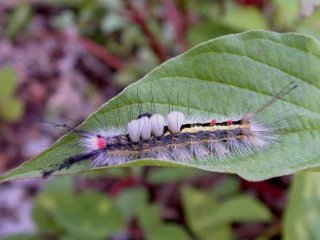Now that we've had some rain, the thistles came out of the ground quite nicely. Garlic mustard was more frustrating, as the seed pods are dry and brittle, and no matter how carefully we cut and bagged them, little black seeds flew all over. We had to pause once in a while to scrape them off our arms and shake them out of our gloves. (Biblical scholars may recall Onan, who was killed for spilling seed on the ground ... but that's a different story, and I trust we will not meet the same fate.) I'm working on a plan to vacuum the entire site, but there are a few bugs to work out yet.
Here's one now: the larva of the white-marked tussock moth.

Isn't that a fancy thing? Don't touch it -- those hairs may irritate your skin. If it's a male it will turn into an unremarkable brown moth, and if it's a female it will be wingless. Wingless! Did you ever? That seems like a pretty raw deal to me.
When I got home I threw my clothes directly into the washing machine -- laundry seems to be a bit of an obsession among our team members -- and when I pulled out my socks afterwards a few garlic mustard seeds fell out. I'm not sure we're going to win this war, but we'll keep fighting.

2 comments:
Hi, Marnie. Here is copy/paste of an article about garlic mustard, from the e-newsletter that LEAF sends out. (To subscribe, go to leaftoronto.org and click "Join the Urban Forest Network".) It is indeed bad stuff; we are indeed battling the forces of evil - hoorah! hoorah!=================================================
WEED STARVES MAPLES FORESTS, STUDY FINDS
=================================================
From CBC News, April 25, 2006
Maples, ashes and other hardwood trees are being harmed by an invasive weed that indirectly slows their growth to about one-tenth the normal speed, scientists say. The researchers, who report in Tuesday's issue of the journal Public Library of Science Biology, studied how a tree-stifling weed called garlic mustard impacts native hardwoods in Ontario.
The lead scientist warned that the weed's ultimate effect could be to stifle dominant trees in the forest and even change the type of trees that can grow in the habitat.
Weed harms fungus that aids tree growth
The weed harms hardwood trees such as sugar maples by releasing chemicals that harm a soil fungus that the trees need to grow and survive. The fungi have long filaments that penetrate the roots of plants, forming a network to extend the reach of a tree's roots.
In exchange for providing seedlings with nutrients, the fungi receive energy from the plants. Sugar maple, red maple and white ash showed less fungal colonization and grew only about one-tenth as fast in soil infested with the weeds.
Only hardwoods affected
Studies on 16 other species of seedlings showed only hardwoods were harmed by garlic mustards. "This suggests garlic mustard invades the understorey of mature forests by poisoning the allies of its main competitors," Stinson said in a release.
The experiments were done by researchers at Harvard University, the University of Guelph, the University of Montana, Purdue University, and the UFZ Centre for Environmental Research in Germany.
Thanks for that, Leigh. I think I'll quote from it in an upcoming post, so more people see it.
Post a Comment